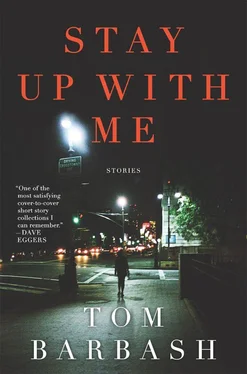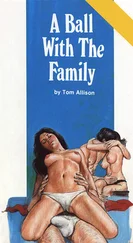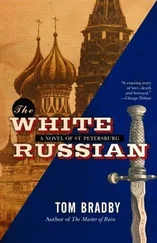They would have children before too long and this whole party would mean something else. Wherever she was he knew she was thinking of him. How could she not? This was their night.
The air had chilled and he could see his breath. He realized he didn’t really know the group he was out on the street with. They were the friends of Jordan, and Jordan was here, but Timkin had never really liked Jordan that much. He thought Jordan was spiteful and shallow and possibly an alcoholic.
He thought he recognized some of the faces he passed; a few were people who’d grown up in the neighborhood, including a girl named Tara Feinberg he’d had a crush on. “Hey!” she said. “How are you?”
“Great,” he said and she said the same, and he kept saying that to everyone who asked, “Great” and “Can’t complain.” He glanced up at his apartment window and saw the darkened silhouettes of people moving within, touching arms, listening to stories, eating, and laughing. It made him think of store mannequins enacting scenes in the windows of Saks and Barneys. Were they any less lifelike? He was becoming scornful, he thought. And this was not a scornful night, although he kept picturing someone pouring gasoline on one of the balloons and setting it on fire.
Back upstairs he had another scotch, and soon after that a glass of wine. Not so much because he needed or wanted them, but because they gave him things to do other than to get into a long conversation, which he felt would eventually bring him back to Amy.
When he was a boy, Timkin would go out at midnight in his pajamas to see the balloons. His favorite was always Underdog, because he identified with him, and decades later, at the end of these parties, he would call Amy Polly Purebred (Underdog’s bitch, Amy liked to say) and she would play along. She liked Timkin’s friends and they, for the most part, took to her, other than Lilia, who told Timkin once that she didn’t trust Amy, that she thought Amy would fool around on Timkin someday.
He looked over now to Lilia and she waved to him and returned to her conversation.
Timkin’s mother called at 11:30 to ask how everyone was, and Timkin held the phone out to the room so she could hear the party’s chatter.
“What is Amy wearing this year?” she asked.
Timkin described one of Amy’s cocktail dresses, a slinky, bare-backed number he’d bought her before a New Year’s party at the River Café.
“I’m so glad you’re living there, that someone’s putting that place to such good use.”
Sabrina Willis asked Timkin, “Which Marriott?” She had called one and they hadn’t had an Amy Timkin registered there.
“I thought it was the Marriott,” he said.
“Let’s call her cell phone.”
“I already did,” Timkin said. “She was going to sleep. She had a long day.”
“Oh, she’ll talk to us. I’m calling.”
“Don’t,” Timkin said a bit too forcefully. “I mean I promised Amy we’d let her sleep.”
Sabrina shrugged.
“I miss her. Would you tell her that I missed her?”
“I will,” Timkin said.
And then Sabrina went and joined her husband in the kitchen.
There were now, he guessed, a hundred and thirty people in his apartment. It might have been the best party he’d given. It was cold out and the mulled cider had been a good idea, and people had had a lot to drink, but not so much that anything out of control was likely to happen.
Buzzed himself and feeling flushed, Timkin moved from circle to circle, freshening glasses, making introductions, greeting utter strangers who were arriving now in significant numbers. He’d ask the lot of them to leave at around two or maybe three if it was still going strong. Who knew when or if this would ever happen again? It reminded him of an Irish wake — a celebration at a time of loss, though he wasn’t ready to say yet that he’d lost anything.
Someone reached around and hugged him then from behind.
Amy, he thought, just as he’d wanted, as he’d been imagining all night. The grip was tight and had all of the affection and penitence he had anticipated from her.
But it was Lilia. “What’s up?” he said, and she held his glance for too long.
“I know,” she said.
“You know?”
“I’m not blind.”
“She’ll be here tomorrow,” Timkin said.
Lilia smiled sadly.
“It’s true, you know,” he said, still believing it.
“ Fuck her.”
“I’m drunk,” Timkin said proudly.
“As you should be.”
Someone pushed the music louder. The dining room table got cleared off to the side and around a dozen people were dancing. The lights dropped. A woman in a tight lavender dress whispered something into the ear of a faintly bearded man in a crisp white dress shirt. People filled every room in the apartment — the kitchen, the bedrooms, and the hallways. Strangers would sleep together tonight, he thought; maybe someone was falling in love. Timkin pictured Amy out on the street looking up at their window. Would she have any idea what was happening inside? Would she know what she was missing? Would she see all that was still possible?
It felt like the moment in a movie before something terrible occurred, before the iceberg or the rogue wave.
If I could only stop the film right here, he thought. He took a deep breath and let the spinning room and Lilia’s solicitous face settle before his eyes.
“You know what she told me once?”
“What?”
“She told me once she almost didn’t marry you; that what it came down to more or less was how much she loved this apartment.”
“That’s bullshit.”
She leaned in and kissed him and Timkin pulled away, as if from a flame.
He refused to believe Amy would ever say anything so unkind. His love for her was his insulation against whatever bad news the world had in store for him.
He stood now at the center of the dance floor, at the center of his party and soaked it all in, all the love and laughter. He closed his eyes, and when he opened them again, his guests were all looking his way. He could see everyone from everywhere: his childhood friends, and his high school teachers, his colleagues from work and people he had liked and admired, or secretly feared. They were all here, and likely Amy was here somewhere as well. That was the nature of the night — you could see your entire past all at once and you could figure out who you were and what it all added up to.
Timkin took a long sip of what he hoped was his own drink, then held the glass aloft. Someone cut the music; they were waiting for the host to speak.
“To Amy!” he called out to everyone he could see. “To Amy!” a chorus of them yelled back, and if this was only the start of the darkest part of his life, Timkin marveled at what he’d already been able to make of it.
M y son, Rajiv, is sleeping with a student from my Dante class. I had made the poor decision of inviting the twelve of them to my house — always perilous — always the chance of someone stumbling on an old letter or journal entry, or some embarrassing laundry or rotted piece of fruit in the refrigerator. And then my son started talking to Rachel Weisman, the slender, dark-haired junior from Santa Barbara, California, with the forthright eyes and the full-lipped mouth, who’d been three times to my office hours. And as I chatted with the rest of the class I kept the two of them in the corner of my awareness. My son has a lot of what I wished for when I was a young man growing up in Bombay. He is well read, and well bred to a point. He is a winning conversationalist, and there are friends of mine who can’t believe the eloquent sentences that come forth from his lips, on literature or politics — at that age. “What sort of food do you feed him?” my colleague Jan McAdam asked me. Which had to do, I can only presume, with Jan’s own overheated feelings for Rajiv. So I might have been wiser to have my class over — if I was to have them over — on a night when my son was out at a baseball game (though he doesn’t go to ball games), or at the alternative newspaper where he serves as arts editor, or at the movies. But one thing led to another, as things do, and he was, well, sleeping with this girl.
Читать дальше












